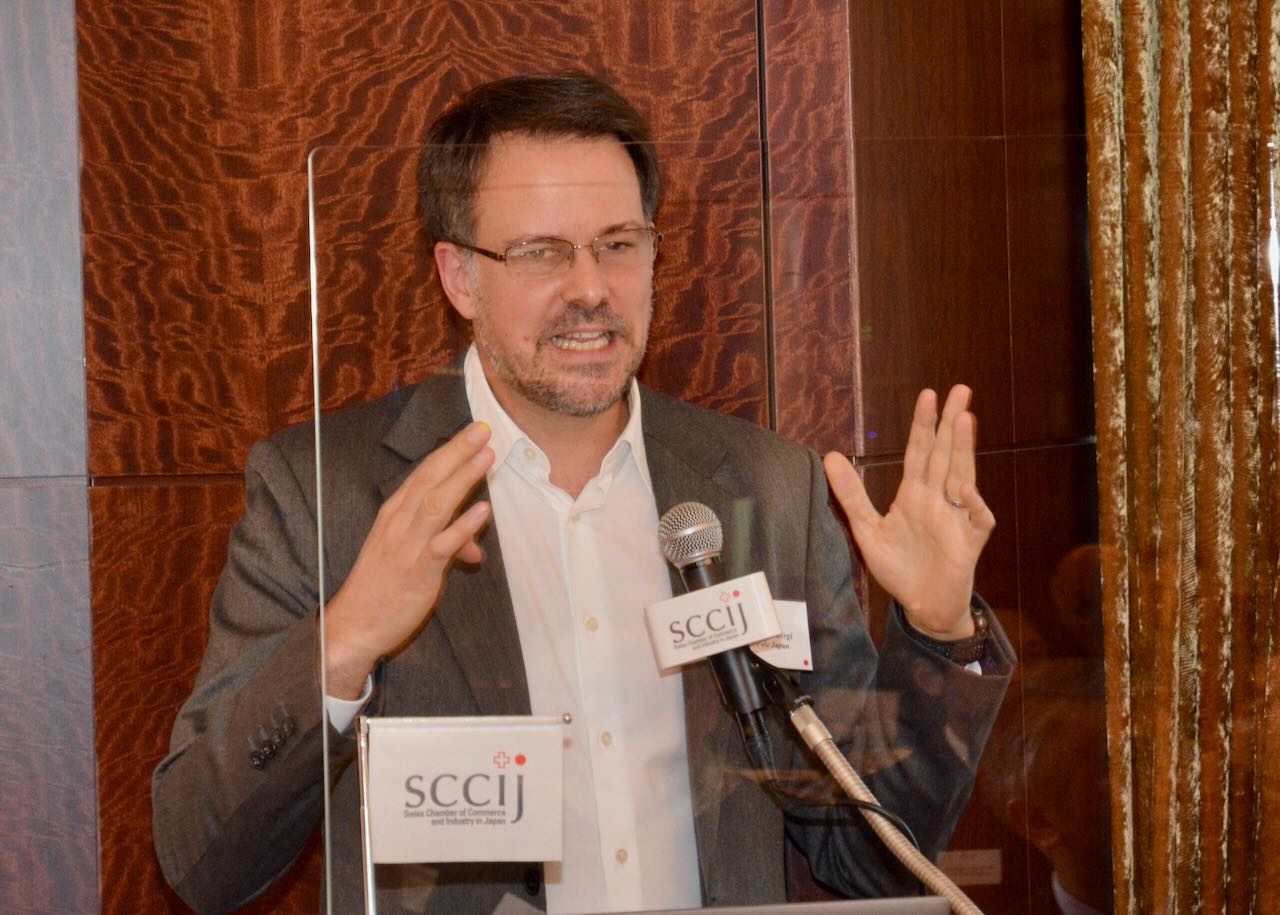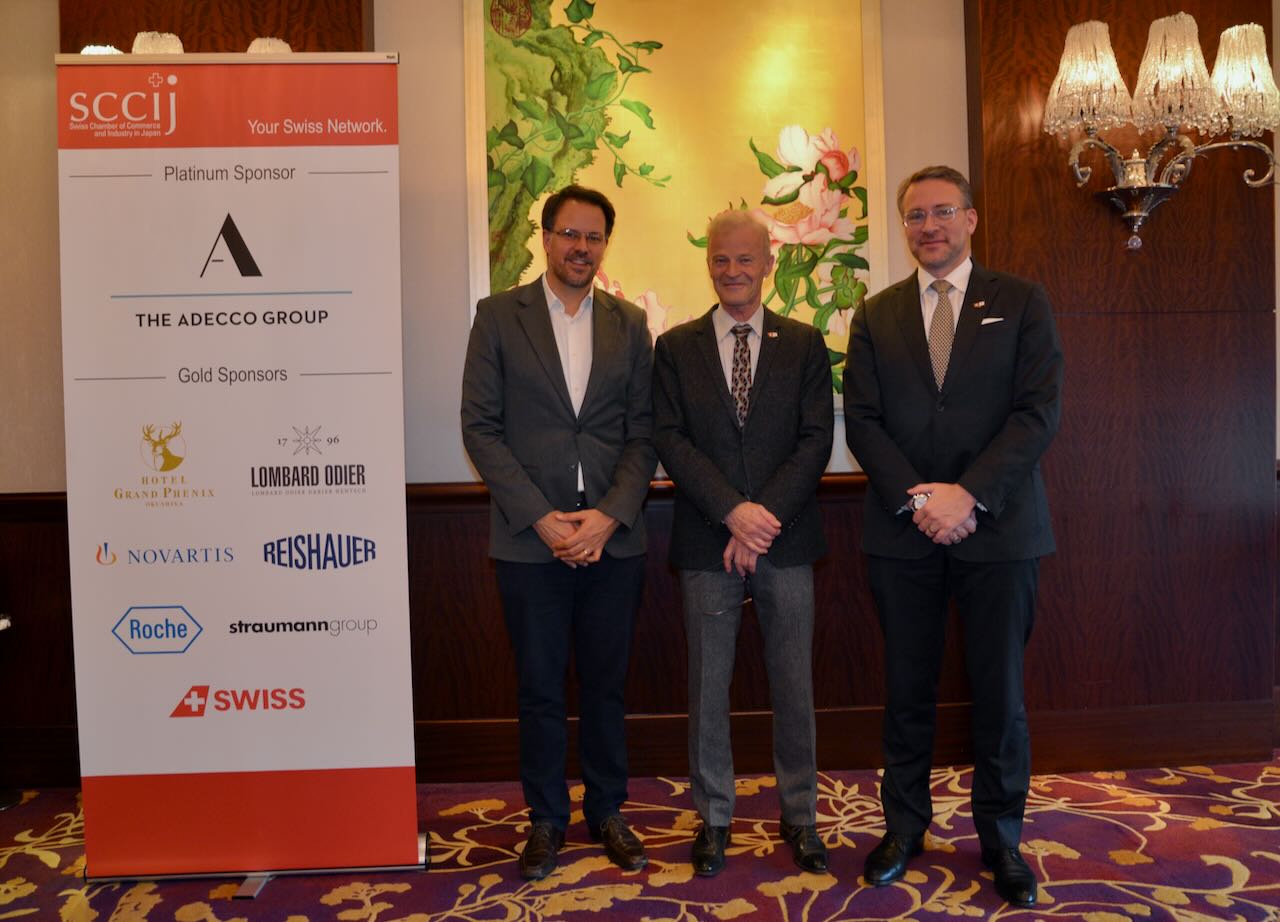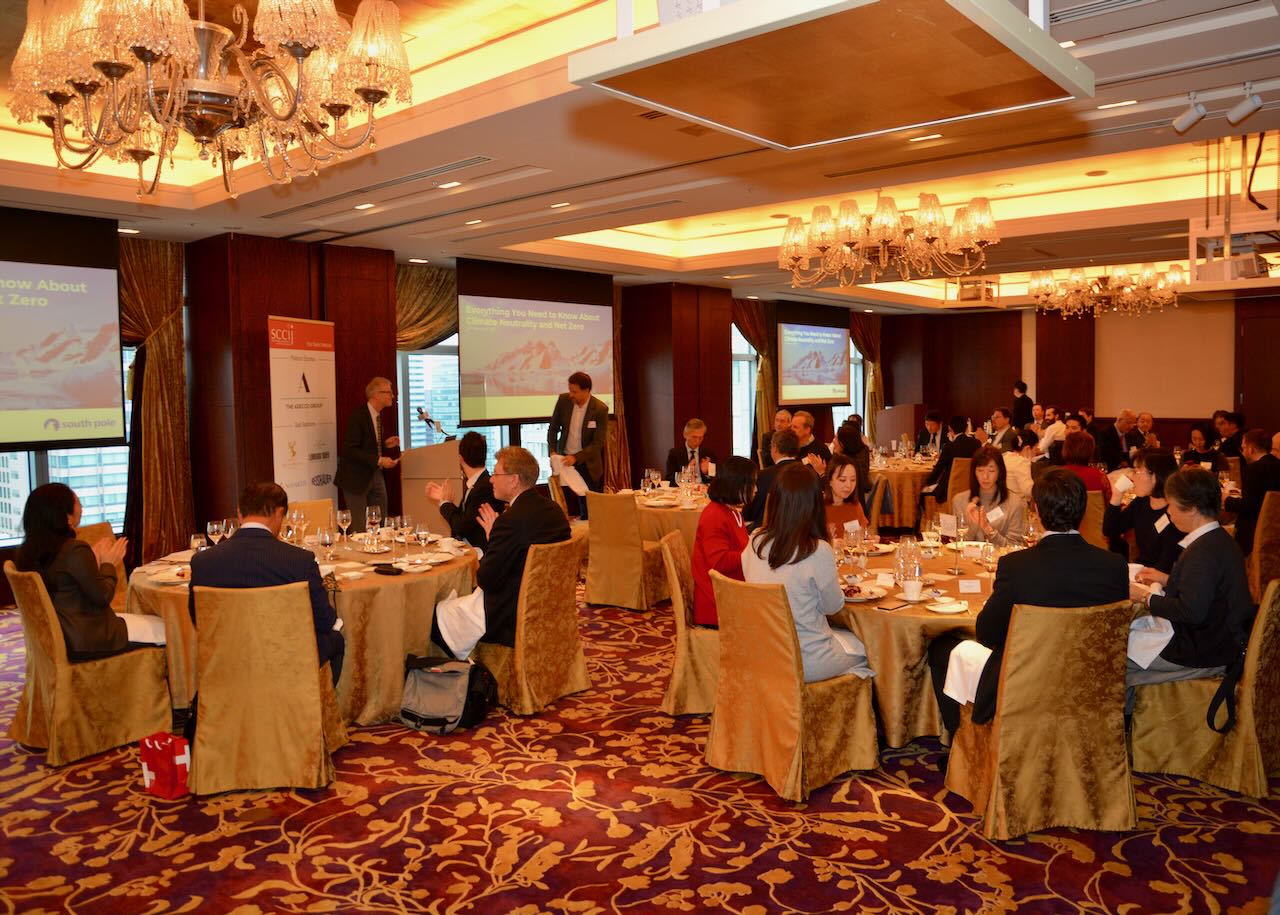Tokyo (SCCIJ) – About 50 members and guests of the Swiss Chamber of Commerce enjoyed the December luncheon talk by Mr. Patrick Buergi, the Swiss co-founder of South Pole, an organization working to fight climate change. Mr. Buergi emphasized the need for a deeper understanding of the term “net zero” to plan a successful path to reach this goal. We present his speech below in the form of a Q&A.

SCCIJ December Luncheon speaker Patrick Buergi of South Pole about the corporate way to net zero.
16 years after its creation in 2006, South Pole has opened an office in Japan, with you as Managing Director. Why this move, why now?
Mr. Patrick Buergi: Indeed, it was about time. We have offices in China, India, and Southeast Asia, so Japan is our last frontier in Asia. But finally, we have arrived in Tokyo and we are embracing this opportunity by sending one of our five founders – myself – to lead our effort here. Japan was lagging in corporate sustainability compared to European companies, but due to increased pressure from regulators, shareholders, and other stakeholders, companies are moving fast now.
What are the reasons for your optimism?
P. Buergi: Japan stands out in two areas. More than 1,000 Japanese companies have declared their support for the Task Force on Climate-related Financial Disclosures (TCFD), an advisory body set up by the G20 to address concerns about companies’ inadequate disclosure of climate-related risks and opportunities.
Second, Japanese companies account for 15% of all RE100 signatories, which is a global corporate renewable energy initiative for companies committed to 100% renewable electricity. Japan also ranks third in the number of companies supporting the Science Based Targets initiative (SBTi), which sets science-based climate targets.
How can South Pole, your organization, contribute to this change in Japan?
P. Buergi: South Pole has been at the forefront of decarbonization since its creation in 2006. We have the conviction and the tools to show companies the way to achieve net zero. Our origins are connected to the Kyoto Protocol because we started as a project developer to enable companies to achieve the Protocol’s goals.

December Luncheon speaker Patrick Buergi of South Pole, SCCIJ President Andre Zimmermann, and Executive Committee member Matthias Sutter (from left to right).
What is your main message?
P. Buergi: Climate change is a result of human activity. The enormous volume of emissions should be considered a waste of mankind’s industrialization. As a result, putting a brake on climate change is a waste management issue. My main message today is that we need urgent and transformative action to reduce, avoid and remove emissions, to get us on a more sustainable pathway to a greener future. The level of transformation required is unprecedented and surpasses previous global transformations by humankind like the agricultural and industrial revolutions of the last century.
What can you offer companies in Japan to help them set a net zero emissions goal?
P. Buergi: At South Pole, we have three business lines: The first one is climate solutions. Here, we offer sustainability advisory services, where we measure greenhouse gas emissions, help companies to set ambitious climate targets and respective strategies to achieve them, recommend renewable energy solutions, assist companies in making their supply chains more sustainable, and provide carbon credits so companies can compensate for their emissions.
Second, we develop climate projects. This is where we started. We work with companies, governments, NGOs, and landowners to develop emission-reduction projects that issue carbon credits. We also advise governments on climate policy and the design of climate change mitigation programs.
Finally, we facilitate investments in climate mitigation and adaptation, beyond a company’s operations. This is about the management of funds, facilities, platforms, foundations, and coalitions across several different topics, including renewable energy, clean technology, sustainable landscapes, and cities.

An impression of the SCCIJ December Luncheon.
What are the credentials of South Pole? After all, many consultancies claim to help companies achieve their goal of net zero emissions.
P. Buergi: Our endeavor started much earlier than most, and our track record speaks for itself. So far, we have led or supported more than 1,000 climate action projects in 50 countries and reduced the amount of released carbon dioxide by 170 million tons. We are located in over 35 locations worldwide and have over 1,200 experts on staff to help with every imaginable problem a company can face. Sometimes we say we are a ‘one-stop shop’ for climate action since we work in every conceivable area of climate change.
Who are you putting your hopes on?
P. Buergi: Well, the cruel reality of climate change is that it is caused by the activities of private and public companies. The choices we make as individuals and consumers also have a big impact on climate change. Unfortunately, the 2015 Paris Agreement is not binding. Many governments are not willing to take tough action. The Japanese government, for example, also relies on a voluntary approach at the moment, but in the meantime, companies are facing pressure from activist investors, employees, and consumers. They seem to be moving faster than governments, and we are ready to support them. Companies have an important role to play in showing leadership and demonstrating that change is possible. However, without the right policies and regulations, we will not be able to achieve the required level of transformation of the global economy.
What are your feelings when you look ahead?
P. Buergi: I am an optimist but I also recognize the urgency of the issue. We are the last generation that can make a difference because any increase in the atmosphere’s temperature cannot be reversed. Once the polar ice has melted, there is no going back. The clock is ticking, we have to work out countermeasures today.
What should companies do?
P. Buergi: : As a start, they have to understand the difference between net zero and carbon neutrality. Net zero is a science-based long-term goal where a company’s emissions are reduced to a minimum and any remaining emissions are removed from the atmosphere. Carbon neutrality means that companies offset their emissions in the short term with carbon credits. With this understanding, companies should then set and communicate ambitious science-based net zero targets and develop a roadmap to get there.
But due to the nature of any business, these emissions cannot be reduced to zero quickly.
P. Buergi: : While companies are decarbonizing, companies should take responsibility for their emissions today and compensate for them by financing climate action projects that avoid the release of greenhouse gases – while contributing to sustainable development in developing and emerging economies, which lack the financial resources for their economic transformation. These climate action projects could include forest protection or renewable energy projects, or projects that take carbon dioxide out of the atmosphere and store it permanently via nature-based solutions or emerging technologies such as direct air capture.
Japan considers introducing a carbon credit tax in 2027. What is your advice?
P. Buergi: : It would be welcome news! Voluntary carbon markets are not sufficient to deliver the required transformation to tackle climate change. To put this into context: the world is currently spending 15 times more on dog food than on voluntary carbon credits. By 2030, this voluntary market will grow to 30 billion dollars but it will still be too small to make a substantial dent in greenhouse gas emissions.
How essential is government regulation for the goal of net zero?
P. Buergi: : Carbon pricing schemes are increasingly being adopted and there are many examples, positive and negative ones, that Japan can learn from. One clear recommendation related to carbon tax schemes is around the need to account for social justice. A carbon tax should not disproportionally affect people with low income. This issue has led to demonstrations and reversals of such policies in Europe for example. Therefore, despite the current distracting discussion about greenwashing and other critiques of climate action, I am optimistic that carbon pricing efforts can make a big difference in fighting climate change.
Biography of the speaker
Mr. Patrick Buergi is a sustainability expert with twenty years of experience in carbon markets, climate policy, corporate sustainability, and impact investing. He is a co-founder of both the myclimate Foundation in 2002 and South Pole in 2006. In mid-2022, Mr. Buergi relocated to Tokyo to lead the establishment of South Pole’s presence in Japan. He holds an M.Sc. in mechanical engineering from the Swiss Federal Institute of Technology in Zurich.
Text and pictures: Martin Fritz for SCCIJ





























